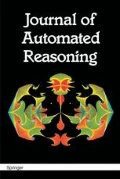Abstract
In this paper, we define a new class of tractable theories: EPCCL theories. Using EPCCL theories as a target language, we propose a new method for knowledge compilation. It is different from existing approaches in that both the compilation and the querying are based on the extension rule, a newly introduced inference rule. With our compilation method, arbitrary queries about the compiled knowledge base can be answered in linear time in the size of the compiled knowledge base. For some theories, the compilation can be done very efficiently, and the size of the compiled theory is small. Furthermore, our method suggests a new family of knowledge compilation methods.
Similar content being viewed by others
References
Cadoli, M. and Donini, F. M.: A survey on knowledge compilation, AI Communications 10 (1997), 137-150.
Darwiche, A. and Marquis, P.: A perspective on knowledge compilation, in IJCAI, 2001, pp. 175-182.
Dechter, R.: Bucket elimination: A unifying framework for structure-driven inference, in Proceedings of the NATO Advanced Study Institute on Learning and Inference in Graphical Models, 1998, pp. 75-104.
Dechter, R. and Rish, I.: Directional resolution: The Davis-Putnam procedure, revisited, in Proceedings of the 4th International Conference on Principles of KR&R, 1994, pp. 134-145.
del Val, A.: Tractable databases: How to make propositional unit resolution complete through compilation, in J. Doyle, E. Sandewall and P. Torasso (eds), Proceedings of the 4th International Conference on Principles of Knowledge Representation and Reasoning, Morgan Kaufmann, Bonn, 1994, pp. 551-561.
del Val, A.: An analysis of approximate knowledge compilation, in Proceedings of the Fourteenth International Joint Conference on Artificial Intelligence (IJCAI-95), 1995, pp. 830-836.
del Val, A.: Approximate knowledge compilation: The first order case, in Proceedings of the Thirteenth National Conference on Artificial Intelligence (AAAI-96), 1996, pp. 498-503.
del Val, A.: On some tractable classes in deduction and abduction, Artificial Intelligence 116 (2000), 297-313.
Hai, L., Jigui, S. and Yimin, Z.: Theorem proving based on extension rule, J. Automated Reasoning, to appear.
Karnaugh, M.: The map method for synthesis of combinational logic circuits, Trans. AIEE, Communications and Electronics 72 (November 1953), 593-599.
Marquis, P.: Knowledge compilation using theory prime implicates, in Proceedings of the Fourteenth International Joint Conference on Artificial Intelligence (IJCAI-95), 1995, pp. 837-843.
Schrag, R.: Compilation for critically constrained knowledge bases, in Proceedings of the Thirteenth National Conference on Artificial Intelligence (AAAI-96), 1996, pp. 510-515.
Schrag, R. and Crawford, J.: Implicates and prime implicates in random 3SAT, Artificial Intelligence J. 81 (1996), 199-222.
Selman, B. and Kautz, H. A.: Knowledge compilation using Horn approximation, in Proceedings of AAAI-1991, 1991, pp. 904-909.
Author information
Authors and Affiliations
Rights and permissions
About this article
Cite this article
Hai, L., Jigui, S. Knowledge Compilation Using the Extension Rule. Journal of Automated Reasoning 32, 93–102 (2004). https://doi.org/10.1023/B:JARS.0000029959.45572.44
Issue Date:
DOI: https://doi.org/10.1023/B:JARS.0000029959.45572.44




